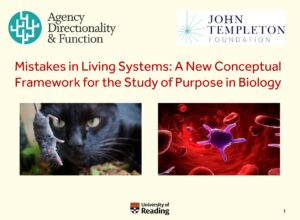Project title: Mistakes in Living Systems:
A New Conceptual Framework for the Study of Purpose in Biology
Video Introduction to the Project
(click image above to watch video)
Project dates: Nov. 2021 – July 2024.
Amount: USD 1million (c.£720k)
Funder: The John Templeton Foundation
Funding initiative: Agency, Directionality and Function: https://www.biologicalpurpose.org/
This is a multi-year, multi-million pound research program funded by Templeton.
Team: Prof. David Oderberg (PI, Philosophy, School of Humanities), Prof. Jonathan Hill (CI, Psychology and Clinical Language ), Prof. Ingo Bojak (CI, PCLS) and Prof. Jon Gibbins (CI, Biology)
Research partners: twenty-four teams of researchers in philosophy and biology from around the world, all working on different aspects of purposiveness and function in biology.
Note: Reading is one of only four UK universities to receive an award as part of this funding initiative. This is the first Templeton Foundation award for the University of Reading.
Summary
Living things make mistakes. Non-living things do not. A proton or electron, a stone or a water droplet, obey the laws of physics alone. Physicists make mistakes, to be sure, but purely physical objects do not get things wrong: they do what they according to the iron laws of physics.
In biology, things are different. In fact, biology is full of the language of mistake-making. There are DNA copying errors. An antibody can mistake a pathogen for a harmless organism. A cat might mistake poison for food. A fish can be fooled by colourful bait. But what does it mean for an organism, or part of an organism, to make a mistake – to get something wrong, and what does it tell us about how biological systems function?
Philosophically, an analysis of biological mistakes is powerful. It helps us clarify that biological systems depend on there being processes that are not fully constrained by physico-chemical laws. They have additional constraints that tie action to proper function. This has major implications for the question of whether biological processes are reducible to physics.
Empirically, the Mistakes in Living Systems project will involve intensive research into the phenomenon of biological mistake-making. The team will investigate kinds of mistake. For example mistakes in the timing of action lead us to questions of how timing of effective action is regulated and mistakes in recognition lead us to ask about the tasks of discrimination and classification that the system makes.
Working with two postdoctoral research fellows, the team will develop a conceptual framework for biological research that promises novel hypotheses for empirical testing. In particular, we will focus on haemostasis – the blood clotting system – in order to develop testable hypotheses concerning possible misrecognition by platelets of the drivers of clotting.
The team will use computational modelling to explore the boundary between physics and biology via the framework of mistakes. The project will highlight the essential role of normative notions in biology – purpose, function, goal-directedness, rule following, and allied notions. This in turn will inform the team’s ambitious aim, which is to develop a theory for biology that ultimately does justice to the complexity of mind and is scientifically productive in the behavioural sciences.

